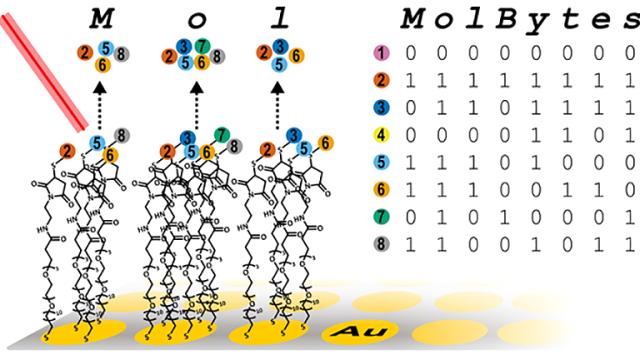By 2020, researchers estimate that the world’s digital archive will weigh in at around 44 trillion gigabytes. That’s an astounding amount of data that isn’t necessarily being stored in the safest of places. Most storage mediums naturally degrade over time (if they’re not hacked or accidentally destroyed) and even the cloud isn’t as reliable as companies want us to believe.
So researchers at Harvard University have turned to some unique chemistry they believe could safely archive the world’s data for millions of years — without requiring any power.
There’s been considerable research conducted on using DNA — Mother Nature’s tried-and-true data-storage method — as an alternative way to archive everything humanity wants to save, but to date, the practicality and cost of such methods have kept that approach relegated to laboratories and limited experiments. So instead of directly copying Mother Nature, chemists at Harvard University took inspiration from her and came up with a way to store data using oligopeptides: molecules made up of amino acids that are considerably smaller and easier to work with than DNA.
Writing data is accomplished using a so-called microwell, a thin metal plate perforated with 384 tiny holes. These holes are filled with different and unique oligopeptides made up of amino acids of various molecular weights, with the distribution based on the same digital binary code that computers rely on. A device called a mass spectrometer can be used to read the stored data by simply detecting and sorting the oligopeptides by their masses; heavier ones sink and are read as absent, while lighter molecules float to the top and are registered as present.
It’s then a case of translating all the detected molecules into tiny snippet of information they represent. A mixture of eight oligopeptides can be used to store one byte of data, 32 oligopeptides can store four bytes, and so on.
“Think storing the contents of the New York Public Library with a teaspoon of protein,” Brian Cafferty, a Harvard postdoctoral fellow and lead author of the study, said in a statement.
But don’t tear the SSD out of your laptop just yet. The Harvard researchers have only managed to write, store, and retrieve a paltry 400KB of data so far, including a Richard Feynman lecture and a couple of images. Read and write speeds are also excruciating slow compared to modern flash storage (about 8 bits per second for writing, and 20 bits per second reading) and retrieval accuracy tops out at 99.9 per cent, but error correction algorithms could step in to make this new storage method more reliable.
Using molecules to store data would be more of a complement to existing storage technologies, not a replacement. The limits to the read and write speeds could definitely be improved as the research evolves, but the real advantage to this approach is that oligopeptides can survive for hundreds of thousands of years under the proper conditions, which don’t necessarily have to include light, oxygen, water, or a temperature controlled environment. It could potentially be the ultimate time capsule, although a spoonful of molecules doesn’t make for great TV when it’s eventually unearthed in a thousand years.
